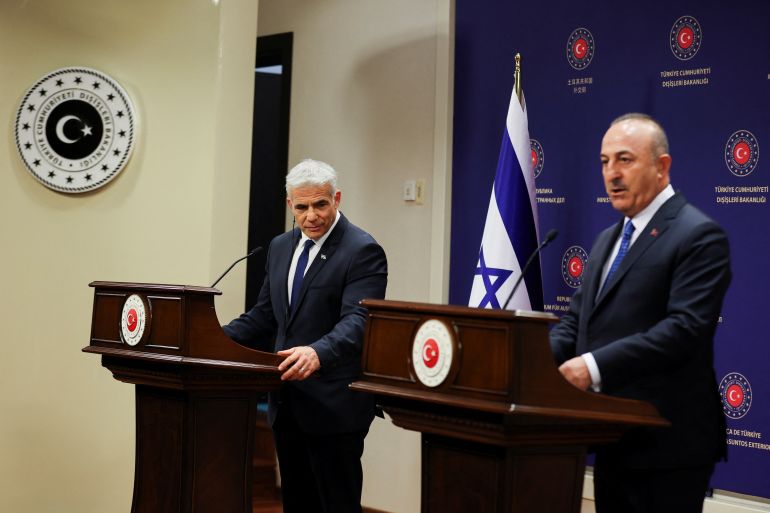Turkey foils alleged Iran plot to kill Israelis in Istanbul
Turkish authorities arrested Iranians suspected of planning attacks on Israeli tourists and businesspeople with pistols and silencers.

Israeli Foreign Minister Yair Lapid thanked Turkey on Thursday for helping foil an Iranian plot to harm Israelis in Istanbul and said the effort was still under way.
Turkish authorities arrested five Iranians suspected of planning attacks on Israelis ahead of Lapid’s visit, Turkish media reports said earlier in the day.
Keep reading
list of 4 items‘Come to your senses’: Erdogan criticises Greece over Aegean
Why Turkey, Greece remain on collision course over Aegean islands
‘A new era’: Saudi Arabia’s MBS in Turkey as nations mend ties
Lapid warned Israel would not “sit idly by’ in the face of threats to its citizens from Iran.
“The lives of Israeli citizens have been saved in recent weeks thanks to security and diplomatic cooperation between Israel and Turkey. These efforts are ongoing,” Lapid said during a visit to Turkey.
“We’re not only talking about the murder of innocent Israeli tourists, but also a clear violation of Turkish sovereignty by Iranian terror. We are confident that Turkey knows how to respond to the Iranians on this matter.”
Lapid arrived in Turkey on Thursday for talks with Turkish counterpart Mevlut Cavusoglu as the two countries press ahead with efforts to repair ties strained over Turkey’s strong support for the Palestinians.
Hurriyet newspaper reported Turkish authorities arrested five Iranian nationals on Wednesday suspected of involvement in an alleged plot to assassinate Israeli citizens in Istanbul.
Police seized two pistols and two silencers in searches conducted in houses and hotels where the suspects were staying, according to the report.
No immediate response from Iran was available.
‘Message delivered’
Earlier this month, Israel issued a warning for its citizens to avoid travel to Turkey and urging Israelis in Turkey to leave immediately. The warning said Israeli citizens could be targets of Iranian attacks.
“For its part, Israel won’t sit idly by when there are attempts to harm its citizens in Israel and around the world. Our immediate goal is to bring about calm that will enable us to change the travel warning to [Turkey],” said Lapid.
The travel warning angered Turkey, whose economy depends on tourism to a large extent. Ankara responded by issuing a statement that said Turkey was a safe country.
Standing next to Lapid, Cavusoglu said Turkey “cannot permit these kinds of incidents taking place in our country”.
“We have delivered the necessary messages,” he said, without elaborating.
Iran and Israel have been engaged in a years-long shadow war but tensions have ratcheted up following a string of high-profile incidents Tehran has blamed on Israel.
Tehran alleged Israel was responsible for the killing of Islamic Revolutionary Guard Corp (IRGC) Colonel Hassan Sayyad Khodaei in his Tehran home on May 22.
Turkey’s private IHA news agency reported Iran sent agents disguised as businessmen and tourists to Istanbul to assassinate Israelis in retaliation for Khodaei’s murder and other attacks.
Meanwhile, the IRGC said on Thursday it was replacing its veteran intelligence chief with no reasons given as to why.
Latest rapprochement
Turkey, beset by economic troubles, has been trying to end its international isolation by normalising ties with several countries in the Middle East, including Egypt, the United Arab Emirates and Saudi Arabia.
Turkey and Israel were once close allies, but relations grew tense under President Recep Tayyip Erdogan, who is a vocal critic of Israel’s policies towards the Palestinians. Turkey’s embrace of Hamas, the movement that governs the besieged Gaza Strip, has angered Israel.
The countries withdrew their ambassadors in 2010 after Israeli forces stormed a humanitarian flotilla bound for Gaza, which has been under an Israeli-Egyptian blockade since Hamas came to power there in 2007.
Nine Turkish activists were killed. Israel apologised to Turkey for the deaths under a US-brokered agreement, but reconciliation efforts stalled.
Turkey recalled its ambassador in 2018 after the United States recognised Jerusalem as Israel’s capital, prompting Israel to respond in kind. The two countries have not reappointed their ambassadors.
The latest rapprochement has been led by Israel’s mostly ceremonial president, Isaac Herzog, who has held several telephone calls with Erdogan and visited Turkey in March, becoming the first Israeli leader to do so in 14 years.
Foreign minister Mevlut Cavusoglu visited Israel last month. It was the first official visit to Israel by a Turkish official in 15 years.